| My Shop
(prints
& canvasses)
: |
8,
Rue Porte du Mas, 47170 Sos
marcel@photo-marcel.com |
|
You can get my
photos online at : |
|
|
 |
Speaking of interiors, technique and gear.
When
photographing houses, and especially interiors,
one might encounter some obstacles. Small spaces, backlighting, big differences between light and dark,
dark spaces.
To capture small spaces, I always use an ultra
wide-angle lens indoors, in my case the 7-14 mm
PRO by Olympus, quite an investment, but absolutely worth every penny.
In darker spaces a longer shutter time
can be required, so I never leave home without
my sturdy and reliable... Tripod.
And for other light-issues I use the earlier
explained HDR-technique, which means that every
photo actually exists of three photos, a normal
exposed, an over exposed and an under exposed.
That does take a lot of extra time in post
processing, but definitely takes care of all
lighting problems. |
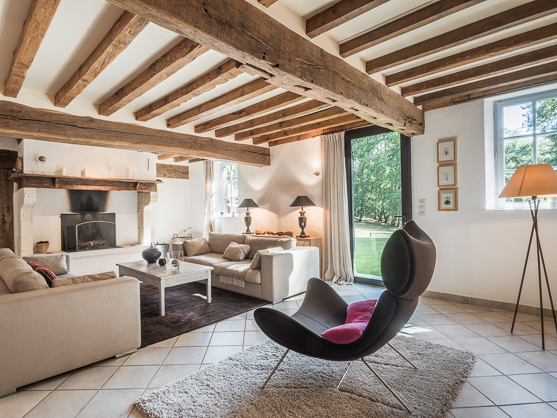
| HDR of 3
photos - Without that, the windows would have
been bleached out |




| Outside
photo - next time I will blog about lines
and composition ;) |
|
 |
Not
just landscapes.
Although I'm specialised in houses, interiors, landscapes, doesn't mean they are my only interest, of course.
Animals are also quite interesting to photograph, as well as people. When there was a bird of prey show in the city of Nérac, I got the chance to get
quite close to some of the birds. And to shoot a couple of very nice portraits.
By using a small aperture value on my camera, I created the nice blurry background, also known as 'Bokeh'. |
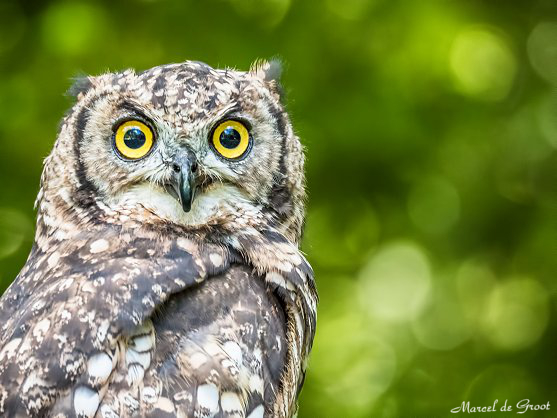
| Portrait of a one year old African Owl |


| Portrait of an African Owl |

|
 |
.RAW Story.
"Those are nice pictures, you're probably very good with Photoshop".
Uh, not really.
"But then you probably use the Google Nik Collection to add colour and details? Many people do these days, I've been told".
Uh, no, I have experimented a lot with it, but I don’t find that a fine program to work with.
"But how then, do you get your photos that detailed and colourful"?
Well, in most phones and compact cameras, the 'negative' of the photo is already 'developed' by the camera and there will be a .JPG file rolling out of the camera/phone, which you can immediately print, or publish online.
With system and DSLR cameras you can choose to develop the 'negative, the .RAW file, yourself. The .RAW file is many times bigger than a .JPG file and contains much more information considering colours, dark and light. A .RAW-file can not be printed or put on the Internet, one has to develop it with the software provided by the camera manufacturer, or another so called. RAW converter, personally I use Lightroom. After developing the photo, I convert it to a .JPG file and then it can be printed or published on the internet.
"So you're using almost no editing software"?
Nope, mainly Lightroom. And Topaz Denoise, because I think of that as a fine noise remover. And Photoshop for perspective-correction, to eliminate a sensor spot if necessary, and to optimise the size and quality for social media.
"Wow ...".
"Then you probably have a very good camera".
Yes, I have.... And a diploma :).
|
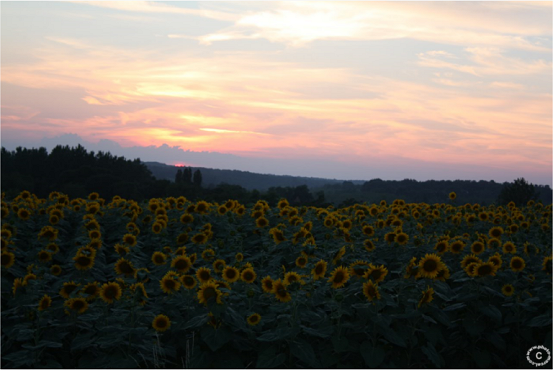

| Simple
development in Lightroom - No adding of
colours or details |

|
 |
Lines, Perspective and Labastide-d'Armagnac.
One of the
more well known places in this region is
Labastide-d'Armagnac. And although I'm always
looking for unknown beauty, I thought I really
had to pay this little village a little visit.
And I must say, it is a beautiful village, full
of atmosphere and interesting buildings. But I
also saw some tourists, all taking the same
photos. If you do a Google-search, you'll see
what I mean.
What I personally like in
photography, is playing with lines in a scenery
and capturing it in a different perspective.
Which means you can often see me lying on the
ground or climbing things.
That day in Labastide-d'Armagnac I gave some people a good laugh
while finding the right perspectives, made quite
some photos, although only six made the cut. You
can find those in my
Facebook-album.
|
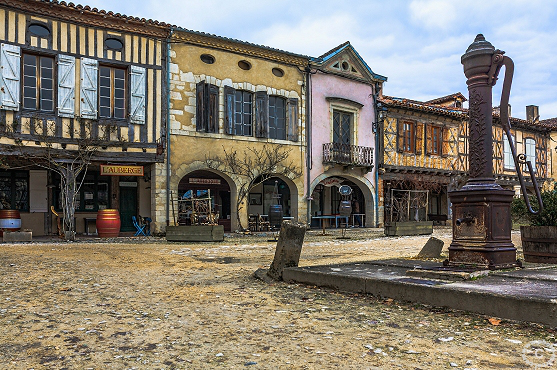 |
 |
Autumn View 'n Software Talk.
In the 'early days' I always used a software program called PhotoMatix to merge my three
exposures to get the final result. Major advantage of this program is that you can use the tonemapping function to adjust the atmosphere very easily and completely to
your likings. It also reveals a lot of detail. Disadvantage though, is that the software adds quite some noise. Which may be pretty annoying, especially
for skies. And if you want to have your photo printed on a large format.
Nowedays I don't use the program very often anymore, but would I discourage the use of
it?
No, because it's still a great program to use for brick buildings, old stone bridges
and interiors. |
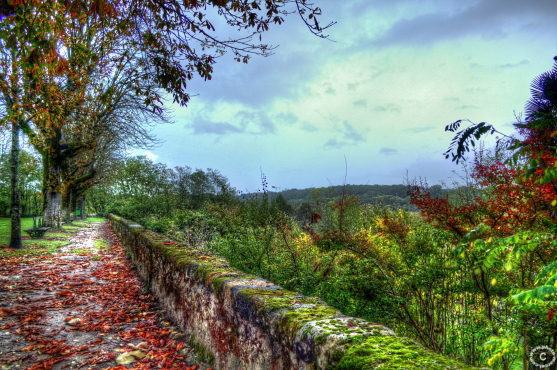
| Autumn View
in the village of Sos - PhotoMatix Version |

| Autumn
View in the village of Sos - Natural Version |
|
 |
A
hot day in September - Booze 'n blue skies
Every part of France has its own culinary specialities.
This part, Gascony, is well known for its Foie Gras and Armagnac. Armagnac is similar to Cognac, but made of grapes.
One day passing an old Armagnac Facory, I stopped to make a photo of it. It was a beautiful day in September, the sky was amazingly blue. |
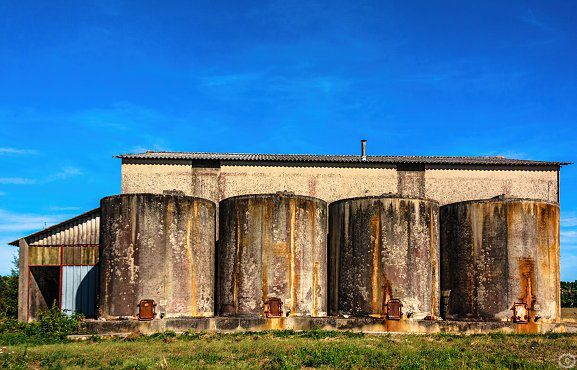
| Then I noticed that the door of the shed
was open, which, for a photographer, is an obvious
invitation to see what's inside. It was a beautiful
still life you couldn't compose even if you tried. |

| A small door at the right, also gave access to the factory itself. There was a lot of difference between dark and light,
so I went back to the car to get my tripod in order
to be able to make over- and underexposed shots.
Blended together with the normal exposed one, this
was the result: |
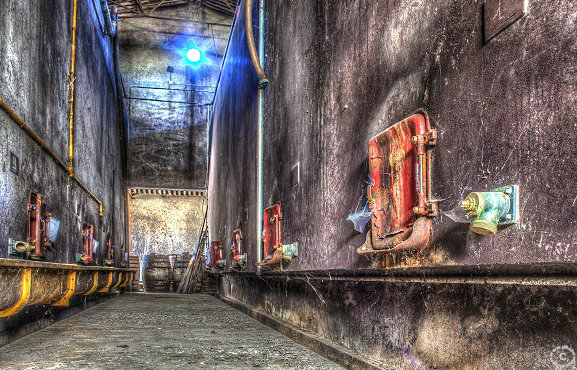 |
 |
A summers day 2013 - The hunt for a special
sunflowers photo
If you
think France, you think sunflowers. I have loads
and loads of sunflower photos but making a
unique one was a challenge. I've been driving
around for days to find a photogenic field, with
some hills in the background and all, to photograph at
sundown. After I found this field I came back a
couple of times to make the shot, but it was
either too cloudy or too clear.
Until this
hot day in July.
I set up my tripod and camera and made a couple
of shots while the sun slowly went down. But the
real magic happened when the sun was gone, the sky
colored 50 shades of yellow and orange. I made a
normal photo as well as un underexposed and an
overexposed one, to make sure I'd capture all the
lights and colors. Back home I blended these 3
photos and... I was happy. Even after years, I still
can enjoy this photo very much.
If you want to enjoy it too, you can buy
it of course ;) or
download it for FREE to use it as your
computer desktop wallpaper. |
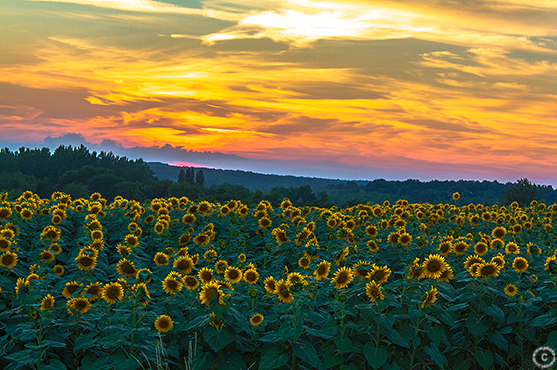 |
 |
Another night in the village of Sos 2013 - Luck,
colors and shutter speed
Walking through the village at
night, means most shutters are closed and there
are not many light sources. This particular night I was
lucky to find the lights under the arcades lit.
But that doesn't mean I could just click and have
a great photo. This one needed an exposure of 30
seconds. Which has the advantage that my camera
captured all the light and colors available. But
I couldn't have done that without a tripod.
Luckily I already bought myself a 16,95
Silvercrest tripod at the LIDL supermarket. It's
easy to use, light weight and works fine if your
camera and lens are also light weight. And if
you don't need to shoot multiple exposures in a
row (this tripod moves inbetween shots...). For
those circomstances one needs a solid tripod and
there are many manufacturers with great names
like Manfrotto or Three-legged-thing. One of
these days I'll have to get myself one of those
:). |
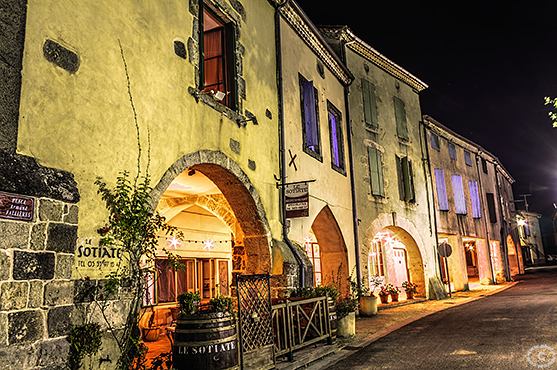 |
 |
Some night in the village of Sos 2013 - How it all started
One night when I couldn't sleep,
I took a walk through the village and suddenly became aware of the influence of light on the atmosphere of the streets,
houses, buildings, everything. So I got my
camera and found myself a nice angle to take a
picture of the local bar. Thrilled with the
result I knew this wasn't gonna be my last night
walk... |
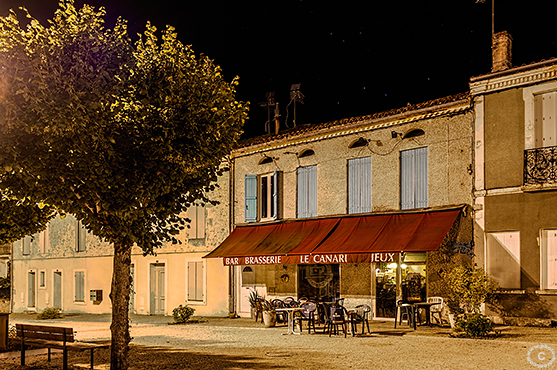 |
|

